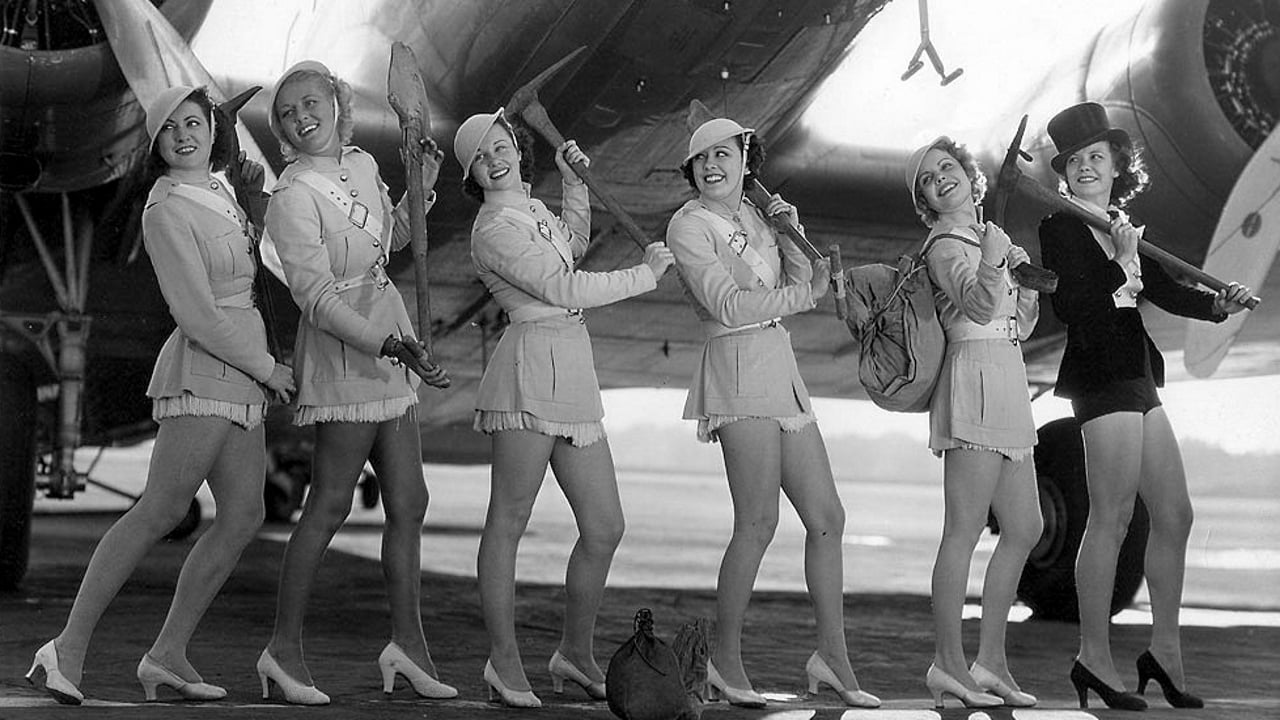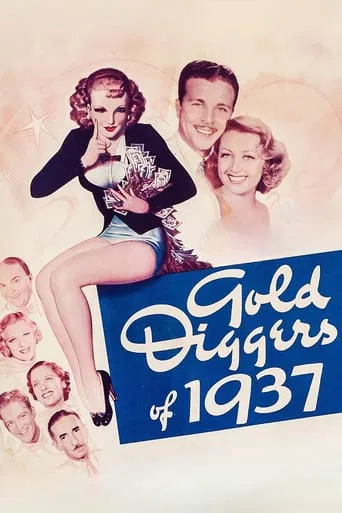

That was an excellent one.
... View MoreTerrible acting, screenplay and direction.
... View MoreDon't listen to the Hype. It's awful
... View MoreIt is both painfully honest and laugh-out-loud funny at the same time.
... View MoreIf you're going to watch a Busby Berkeley-choreographed film, this is a very good bet. That's because it's a lot of fun aside from the weird singing and dancing at the end.The film starts off with one of the weirdest singing numbers I've seen in an old film. At a meeting of insurance agents, Dick Powell sings the sweet ditty 'You'll Get Pie in the Sky When You DIE, DIE, DIE'! And, not surprisingly, the maudlin words are quite funny! A bit later, Powell makes a HUGE sale--insuring a rich guy (Victor Moore) for $1,000,000--an enormous sum for 1936. What Moore and the insurance company don't know is that Moore is no longer rich at all--his two very dishonest partners have plundered Moore's production company that bankrolls Broadway shows. And, once he's insured, these two lovely men HOPE that Moore soon meets an untimely end so they can cover up that they've embezzled the company's funds. Fortunately, they are stopped but Moore is ruined. Can Powell and his friends manage to STILL put on 'the big show' and save poor Moore? The film has the usual final production number that Berkeley was famous for, though you wonder just HOW such a number can be arranged considering they have no money! In today's money, this final number would cost millions to create--and it's eye-popping, that's for sure. You just have to see this giant tribute to the joys of war to believe it! It is exceptionally well done and silly--exactly like most of the famed choreographer's other musicals.So why did I give this film an 8? Well, because aside from the weird songs, the plot itself was quite cute and worked well. Victor Moore was great and it helped that there was nice support from the likes of Joan Blondell and Glenda Farrell--two great Warner Brothers 'dames'! Overall, a lot of fun.
... View MoreA nostalgic look at the old-fashioned (and very corny) musicals of the '30s produced by WB is the only reason for viewing this oldie with Dick Powell and Joan Blondell. Not even the veteran scene-stealer Victor Moore is able to salvage the silly plot nor the shenanigans of the scheming Glenda Farrell. The weak excuse for a story is all about being able to put on a Broadway show--namely, getting the money to fund it. When the show finally does get staged, it's done in Busby Berkeley style with camera effects that couldn't possibly be duplicated in a real stage show--including trick special effects. But of course, all logic disappeared when watching musicals such as this in the '30s and depression weary audiences probably couldn't have cared less.One of the crafty villains Morty Wethered (Osgood Perkins) is played by Anthony Perkins' father. And if you look real fast, you can spot Jane Wyman who has one line to speak as a chorus girl.The tunes are nothing to shout about but "Speaking of the Weather" is done in charming style with Powell and Blondell in a rainy day office scene and later reprised during the poolside sequence. "All's Fair In Love and War" is the big finale--but ultimately the viewer is left with the feeling that this has all been done before and with better results in previous "Gold Digger" films. Most earnest emoting in the film is done by Dick Powell who breezed through his Warner musicals with confidence and charm.
... View MoreFairly disappointing following the 1933 and 1935 entries in this series, this film sees Dick Powell in insurance and Joan Blondell as a showgirl who gets a job in his firm. He has a silly name and everyone is chasing a million dollar policy. Cue Victor Moore, that great comic actor, as the creaking gate who just has to be kept alive / not kept alive, depending on who you are. Not that big on songs or routines, two stand out - the garden party with all the duets on the weather, and All's Fair in Love and War, where the girls beat the boys with ... well, that would be giving it away...
... View MoreThe heyday of the Warner Bros./Busby Berkeley musicals was on the wane by 1936. While the key films of the series ("42nd Street" [1933], "Gold Diggers of 1933" [1933]) dealt with putting on a show, and the numbers being parts of that show, Hollywood musicals by the mid-30s were starting to shift to "book numbers," with characters singing and dancing when they should have been talking or walking. "Gold Diggers of 1937" is an attempt by Berkeley to follow this trend, but still hang onto what had worked in the past for him. So there are book numbers and at least one major "show number." The results are middling.Another factor that gave the WB/Berkeley musicals so much energy was the tough talk and slightly risque innuendo that was sparked by the desperation of the dark days of the Depression. By 1936, there were specific factors in place to reign this in. The Production Code was now enforced, keeping the Hollywood studios from including the overtly sexual material that livened so many of Berkeley's numbers.Also, with Roosevelt's election to president, popular opinion swayed from cynicism and frustration to hope and support of the system. The early Berkeley films were nothing if not an expression of hard-bitten despair. In "Gold Diggers of 1937," we still have women forced to use their sexuality on oily moneymen in order to survive economically (one actually says at one point, "It's so hard to be good under the capitalistic system"--Imagine!). But, unlike the early films in the series, this film wants you to feel sympathetic for the millionaire (instead of seeing him as the oppressor).While the studio did give the film some strong stars, the budget seems somewhat lower than usual for Berkeley musicals--except for the final musical number, "All's Fair in Love and War." It's a real stunner--surreal, amazing visuals that stand up to comparison with just about any of Berkeley's greatest numbers. It's probably worth sitting through all of the forced comedy just to get to this one number.
... View More